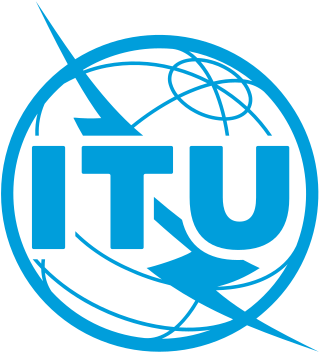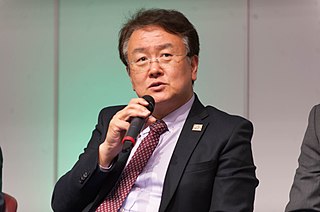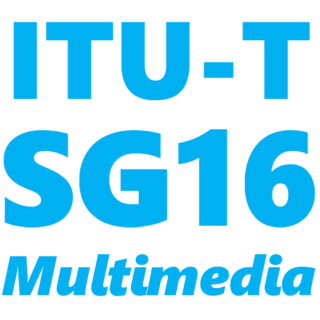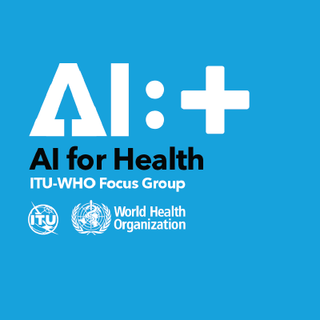
The International Telecommunication Union Telecommunication Standardization Sector (ITU-T) is one of the three Sectors (branches) of the International Telecommunication Union (ITU). It is responsible for coordinating standards for telecommunications and Information Communication Technology, such as X.509 for cybersecurity, Y.3172 and Y.3173 for machine learning, and H.264/MPEG-4 AVC for video compression, between its Member States, Private Sector Members, and Academia Members.

The International Telecommunication Union (ITU) is a specialized agency of the United Nations responsible for many matters related to information and communication technologies. It was established on 17 May 1865 as the International Telegraph Union, significantly predating the UN and making it the oldest UN agency. Doreen Bogdan-Martin is the Secretary-General of ITU, the first woman to serve as its head.
Abstract Syntax Notation One (ASN.1) is a standard interface description language (IDL) for defining data structures that can be serialized and deserialized in a cross-platform way. It is broadly used in telecommunications and computer networking, and especially in cryptography.
The Common Alerting Protocol (CAP) is an XML-based data format for exchanging public warnings and emergencies between alerting technologies. CAP allows a warning message to be consistently disseminated simultaneously over many warning systems to many applications, such as Google Public Alerts and Cell Broadcast. CAP increases warning effectiveness and simplifies the task of activating a warning for responsible officials.
T.61 is an ITU-T Recommendation for a Teletex character set. T.61 predated Unicode, and was the primary character set in ASN.1 used in early versions of X.500 and X.509 for encoding strings containing characters used in Western European languages. It is also used by older versions of LDAP. While T.61 continues to be supported in modern versions of X.500 and X.509, it has been deprecated in favor of Unicode. It is also called Code page 1036, CP1036, or IBM 01036.

World Telecommunication and Information Society Day is an international day proclaimed in November 2006 by the International Telecommunication Union Plenipotentiary Conference in Antalya, Turkey, to be celebrated annually on 17 May.
The ISO/IEC 27000-series comprises information security standards published jointly by the International Organization for Standardization (ISO) and the International Electrotechnical Commission (IEC).

Malcolm Johnson is a British civil servant. He is the Deputy Secretary-General of the ITU and former Director of the Telecommunication Standardization Bureau (TSB) of the ITU Standardization Sector (ITU-T). He was elected Director by the ITU Plenipotentiary Conference, 2006 in Antalya, Turkey. He took office on 1 January 2007 and was re-elected at the ITU Plenipotentiary Conference 2010. At the ITU Plenipotentiary Conference 2014 in Busan, he was elected to a term as Deputy Secretary-General, and at the 2018 ITU Plenipotentiary Conference in Dubai, he was reelected to a second term.

The International Multilateral Partnership Against Cyber Threats (IMPACT) is the first United Nations-backed cybersecurity alliance. Since 2011, IMPACT serves as a key partner of the United Nations' (UN) specialised agency for ICTs – the International Telecommunication Union (ITU).

AI for Good is an ongoing webinar series organized by the Standardization Bureau (ITU-T) of the International Telecommunication Union, where AI innovators and problem owners learn, discuss and connect to identify AI solutions to advance the Sustainable Development Goals. The impetus for organizing global summits that are action oriented, came from existing discourse in artificial intelligence (AI) research being dominated by research streams such as the Netflix Prize.

Chaesub Lee PhD is a telecommunication executive who served as the Director of ITU Telecommunication Standardization Bureau, the permanent secretariat of the International Telecommunication Union Telecommunication Standardization Sector (ITU-T) from 2015 until 2022.
X.1205 is a technical standard, that provides an overview of cybersecurity, it was developed by the Standardization Sector of the International Telecommunication Union (ITU-T). The standard provides an overview of cybersecurity as well as a taxonomy of threats in cybersecurity.

The ITU-T Study Group 16 (SG16) is a statutory group of the ITU Telecommunication Standardization Sector (ITU-T) concerned with multimedia coding, systems and applications, such as video coding standards. It is responsible for standardization of the "H.26x" line of video coding standards, the "T.8xx" line of image coding standards, and related technologies, as well as various collaborations with the World Health Organization, including on safe listing (H.870) accessibility of e-health (F.780.2), it is also the parent body of VCEG and various Focus Groups, such as the ITU-WHO Focus Group on Artificial Intelligence for Health and its AI for Health Framework.

The ITU-WHO Focus Group on Artificial Intelligence for Health is an inter-agency collaboration between the World Health Organization and the ITU, which created a benchmarking framework to assess the accuracy of AI in health.

The World Telecommunication Standardization Assembly (WTSA) is the governing conference of the ITU Standardization Sector (ITU-T), one of the three world conferences of the International Telecommunication Union, and as such, the United Nations system. The quadrennial conference decides the working methods for ITU-T for the next Study Period. It also creates the Telecommunication Standardization Advisory Group (TSAG) and the ITU-T Study Groups and elects their management teams. The Recommendations and resolutions that are approved at WTSA shape the future of ICT standardization.

The Global Standards Symposium (GSS) is a statutory meeting that precedes the World Telecommunication Standardization Assembly. GSS provides a high-level forum for discussion and coordination open to all. The GSS was created by the ITU's treaty-making conference, the Plenipotentiary Conference 2006 in Antalya, Turkey with Resolution 122.
The ITU-T Study Group 13 (SG13) is a statutory group of the ITU Telecommunication Standardization Sector (ITU-T) concerned with networks, infrastructure and cloud computing, including the networking aspects of mobile telecommunications. Examples include: Y.1564, Y.1731, etc.. Recent work includes a series of standards on using machine learning in networking, such as Y.3172, Y.3173, Y.3176, and Y.3181.

The ITU-T Study Group 15 (SG15) 'Transport' is a standardization committee of ITU-T concerned with networks, technologies and infrastructures for transport, access and home. It responsible for standards such as GPON, G.fast, etc.

The Forum of Incident Response and Security Teams (FIRST) is a global forum of incident response and security teams. They aim to improve cooperation between security teams on handling major cybersecurity incidents. FIRST is an association of incident response teams with global coverage.
Trustworthy AI is a programme of work of the ITU under its AI for Good programme. The programme advances the standardization of a number of Privacy-enhancing technologies (PETs), including homomorphic encryption, federated learning, secure multi-party computation, differential privacy, zero-knowledge proof.












